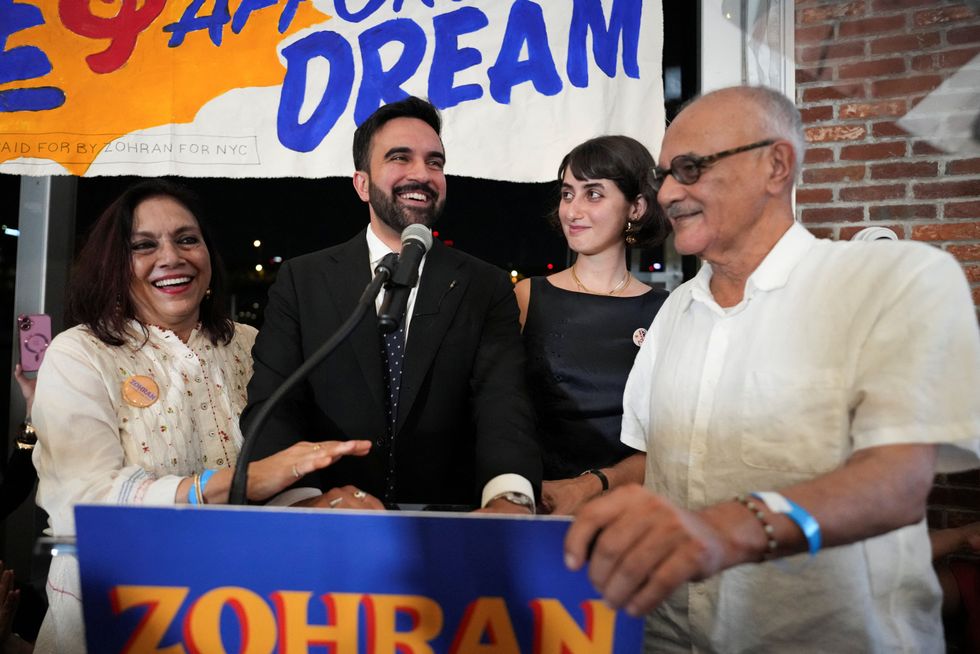LEADING Asian entrepreneurs have told Eastern Eye Labour ministers must remove barriers to growth so businesses can flourish and Britain can attract higher foreign investment.
At the UK Investment Summit on Monday (14), prime minister Sir Keir Starmer told industry leaders that his Labour government would “rip out the bureaucracy that blocks investment” and pledged to slash red tape.
Starmer and chancellor Rachel Reeves have blamed the former Conservative administration for a £22 billion “black hole” in public finances. It has led to suggestions that there will be tax rises when the budget is announced at the end of October.
Anuj Chande is head of the south Asia Business Group, Grant Thornton UK LLP. He leads on the India meets Britain Tracker annual report, in collaboration with the Confederation of Indian Industry (CII), which identifies the fastest-growing Indian companies in the UK. For 11 years, it has charted the contribution of Indian-owned businesses to the UK.
“The chancellor needs to make the UK much more investment friendly than it is at the moment,” Chande told Eastern Eye. “She needs to make sure she creates the right environment for foreign investors to invest in the UK
“And by that, I mean helping with the ease of doing business. There’s still a lot of investors, including Indian investors, who are concerned about the degree of compliance, and the high cost of services required for setting up in the UK.”
He added, “Significant investments, such as the recent stake made in BT Group (by businessman Sunil Bharti Mittal), demonstrate the continued interest from Indian investors in the UK, and UK assets.
“But the high cost of doing business here, due to high property rents and operational overheads, plus the costs that come from the reporting and compliance requirements of the UK’s regulatory system, including high legal fees and audit expenses, can be a significant challenge for any international company to address.”
Speaking at the summit on Monday, Reeves declined to rule out raising the national insurance taxes that businesses pay, saying the government will pay for day-to-day spending through tax receipts and that “decisions will have to be made” to achieve this.
Starmer said the budget would have the “tough love of prudence”, but the prime minister also dismissed reports that capital gains tax rates might rise to 39 per cent as being “wide off the mark”.
Rishi Khosla, CEO of OakNorth Bank, told Eastern Eye the UK remains an attractive option for investors.
“The UK has so much to offer – we have world-class research universities (four of the world’s top 10 universities are here); forward-thinking regulators with an open approach to innovation; a strong framework of common law and a common language; and a time zone that allows true global operations across EMEA, APAC, and the Americas,” he said.
Lord Karan Bilimoria“The result is the UK has created more tech unicorns than any other country, bar the US and China, and is a world leader in terms of attracting investment.”
Hotelier Tony Matharu had similar views to Khosla. He said Britain was one of the best countries in the world to start and scale a business, and that reputation had been carefully earned over recent decades. “London is an unrivalled city and a global leader for business, culture and innovation; renowned and admired across the world for its enterprise and dynamism,” Matharu told Eastern Eye.
“It is also resilient, but requires a government to support its businesses with positive action to enable it to remain a much-loved and admired global city, a magnet for investment and to ensure a strong and competitive future for our capital and country.”
When Labour came to power in July, it pledged to recover the faith of private investors to reinvigorate the UK’s run-down infrastructure and public services.
But many investors – who have long complained that it takes too long to build the kind of infrastructure needed to bolster growth – remain unclear about key tax questions ahead of the government’s first budget.
Kamal PankhaniaThe new government, which has had a rocky start, told investors at the summit in London of its plans to streamline planning to accelerate building, overhaul regulation to promote innovation and deliver cheap, clean energy.
Business minister Jonathan Reynolds said there would be no “bonfire” of regulations, but added that Britain’s problems in attracting the capital and building infrastructure had to be addressed.
“Any talk of reducing red tape is good news, but let’s see the talk translate into reality,” Lord Karan Bilimoria told Eastern Eye. “The previous government led by Rishi Sunak, put up taxes continually to the highest level in 70 years, including putting corporation tax up from 19 per cent to 25 per cent which was a very damaging move. Having high taxes is not good move to attract investment.
“The big worry that businesses and investors from abroad have is what is going to happen in the budget.
“There are serious worries that taxes are going to be put up, including capital gains tax, which is not a good thing at all, because it will hamper investment. It is not a good way to attract entrepreneurship or risk taking.
“We’re all very worried about the budget. I hope they are sensible, and if they are, then the benefits will be growth, job creation, increase in productivity, investment in infrastructure – all the things that the economy needs.”
Britain was among the top destinations for international investment until the 2016 referendum vote to leave the European Union, which triggered uncertainty over future trading rules and years of political instability.
Anuj ChandeAccording to Reuters, the value of foreign direct investment inflows as a percentage of Britain’s economy hit a nineyear low of 2.7 per cent in the second quarter of 2024.
The government, bound by fiscal rules that limit its capacity to borrow, needs to attract billions of pounds of investment.
Chande told Eastern Eye, “There needs to be some focus on making sure that, from a visa perspective, businesses find it easy to get visas for their employees and their secondaries.
“The chancellor needs to make sure she maintains a competitive tax rate for businesses. And lastly, the concern over non-domicile needs to also be listened to, and she needs to make sure that she doesn’t disincentivise people from settling in the UK.”
He added, “Combined with the complexity of the UK’s immigration and visa policies, which require detailed business documentation and proof of economic contribution, it’s evident that there are challenges for any business looking to invest here.
“Streamlining regulatory processes and simplifying compliance, could help to alleviate operational burdens for Indian businesses looking to the UK. This would help facilitate their entry into the UK market and promote a more conducive environment for business growth.”
OakNorth commissioned a report with the Social Market Foundation to examine the range of factors holding back Britain’s most promising businesses from making the essential steps towards growth, and provided actionable solutions to address them.
Vijay PatelThe report found the greatest obstacle holding businesses back from contributing more to the economy was access to ‘human capital’ – skilled people.
They needed the right talent and skills to grow and give themselves a competitive edge, but struggled to find and retain these workers.
The number of overseas workers, students and their families applying for visas to come to the UK has fallen by a third over the last 12 months.
The sharp decline follows rule changes, introduced by the previous Conservative government, which banned most international students and health and social care workers from bringing their family to the UK.
One way to address the shortage in skilled workers was to build a stronger relationship with the EU, according to Bilimoria.
“One of the initiatives the European Union has proposed to the UK, which the government has not said yes to but they should, is a youth mobility scheme, like the one we had with Australia, where 18 to 35 year-olds can work in the UK and EU countries for three years,” said Bilimoria.
“The hospitality sector, for example, in the UK suffering hugely through labour shortages. If you have that youth mobility scheme, we will have lots of people from the EU who will be able to work in the hospitality sector for up to three years.
“If you remember, when we were part of the EU, a lot of the hospitality sector workforce was from the EU.”
Last Sunday (13), the government launched a first formal strategy for industry in seven years that would focus on eight growth sectors – advanced manufacturing; clean energy; creative industries; defence; digital and technologies; financial services; life sciences; and professional and business services.
Britain’s manufacturers had been calling for a new industrial strategy from government, which they say would give them certainty over long-term policy direction in a post-Brexit, post-pandemic world which has undergone energy shocks and high inflation.
Make UK, the sector’s trade body, has said the country is the only major economy not to have a comprehensive industrial plan in place.
Britain last published an industrial strategy under former prime minister Theresa May’s government in 2017.
Rishi KhoslaThe Westcombe group managing director and chief executive, Kamal Pankhania, said the government needed to give budding entrepreneurs the platform to succeed.
“While it’s crucial to attract large international investors, we must remember what has driven our success. At the heart of it all is the entrepreneurial spirit of countless Britons who have set up businesses across the country,” Pankhania told Eastern Eye.
“My own parents came to the UK from Kenya with very little, but today they’ve built one of the most successful property development companies in the UK.
“Their entrepreneurial drive made Westcombe what it is today, but it was the system in place that allowed them to seize opportunities.
“On October 30, the government faces a choice – raise taxes on millions and make that system harder to thrive in, or build a system that enables businesses like ours to grow even further. It’s as simple as that.”
At the UK Investment Summit, Starmer told global business leaders it was “time to back Britain” and promised that where regulation was currently “stopping us building the homes, the data centres, warehouses, grid connectors, roads, train lines, you name it, then mark my words – we will get rid of it”.
“I think they’re making the right noises,” Vijay Patel, chairman of Waymade Capital told Eastern Eye. “They said they will streamline regulations to remove the burden on small and large businesses, and that will be critical in driving economic growth.”
















 Zohran Kwame Mamdani with his parents, Mira Nair and Mahmood Mamdani , and his wife, Rama Duwaji
Zohran Kwame Mamdani with his parents, Mira Nair and Mahmood Mamdani , and his wife, Rama Duwaji Mamdani's supporters celebrate his nomination
Mamdani's supporters celebrate his nomination
